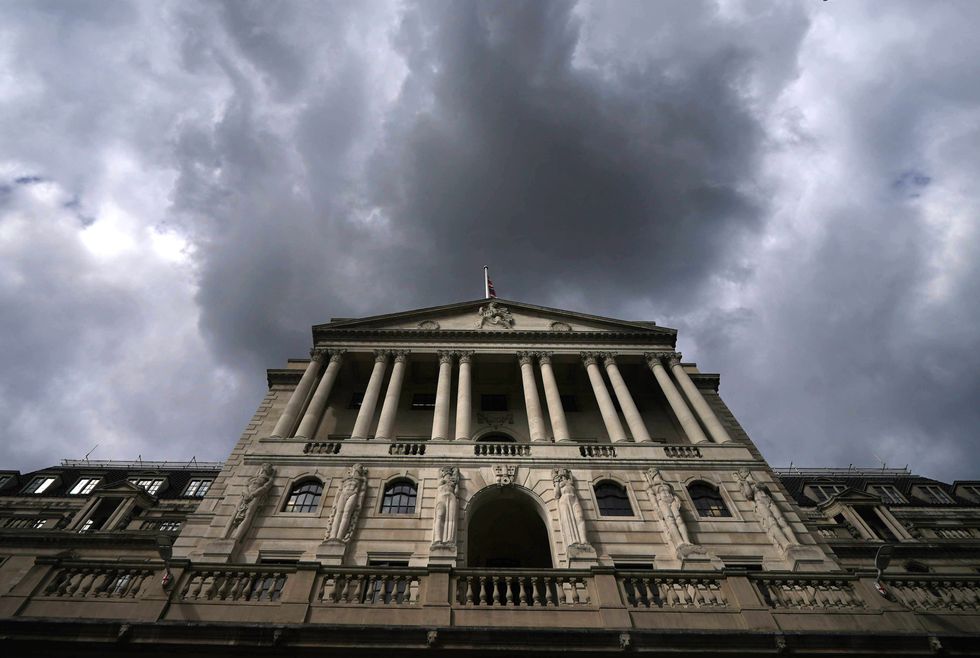UK economy faces ‘prolonged recession if Bank of England fails to cut interest rates'
The Bank of England risks dragging Britain into a “prolonged recession” in its fight against inflation, economists report.If interest rates are kept at their current level, gross domestic product (GDP) would plummet by 0.2 per cent in Q1 this year and 0.4 per cent the following quarter.Yesterday (February 1), the central bank confirmed it would hold the base rate at 5.25 per cent as it attempts to bring inflation down to its desired target of two per cent.However, economists are warning this risks triggering two consecutive quarters of negative growth in the economy, otherwise known as a recession.Do you have a money story you’d like to share? Get in touch by emailing money@gbnews.uk.Inflation is expected to drop below two per cent by the summer but rise again later in 2024, with analysts pricing in significant cuts to the base rate later in the year.Christopher Siepmann, a senior economist at Generali Asset Management, highlighted that GDP growth is projected to to jump from 0.3 per cent this year to 0.6 per cent in 2025.He explained: “This is largely caused by assuming key rates cuts in line with current market expectations to 4.2 per cent by end 2024 and 3.4 per cent by end 2025.“In the alternative scenario, in which the Bank of England keeps its current policy stance of 5.25 per cent, the UK would remain in recession throughout the forecast horizon.”According to Mr Siepman, even if the Bank’s inflation target is not met, the UK’s economy does not require such a tight policy when it comes to interest rates.Based on the central bank’s model, holding the base rate at 5.25 per cent would bring inflation to two per cent for the short term, falling to 1.2 per cent year-on-year by Q2 2026.Mr Siepmann added: “This would imply an overtightening in the longer run and come at the cost of a prolonged recession.“Thus, we expect the Bank of England to start cutting rates in June (May has become less likely today in our view) by 25 basis points and a total of 100 basis points by the end of 2024 which is broadly in line with market views.” LATEST DEVELOPMENTS:Water bills to rise by ‘staggering’ 6% in AprilNationwide Building Society raises mortgage rates after Bank of England decisionEnergy bill hikes push 2.2 million into fuel povertyYesterday, the central bank’s Governor Andrew Bailey confirmed that he was looking to reduce inflation over the longer term, rather than hit the CPI target temporarily.“We do expect it to come near to target this spring. And that is, of course, very good news,” Mr Bailey said.“But we don’t expect that to be the sustained level, it’s going to rise again somewhat thereafter. And it’s really that ‘thereafter period’ that we are most focused on when setting policy. We have to look through the short-run impact that energy prices in particular are having.”

The Bank of England risks dragging Britain into a “prolonged recession” in its fight against inflation, economists report.
If interest rates are kept at their current level, gross domestic product (GDP) would plummet by 0.2 per cent in Q1 this year and 0.4 per cent the following quarter.
Yesterday (February 1), the central bank confirmed it would hold the base rate at 5.25 per cent as it attempts to bring inflation down to its desired target of two per cent.
However, economists are warning this risks triggering two consecutive quarters of negative growth in the economy, otherwise known as a recession.
Do you have a money story you’d like to share? Get in touch by emailing money@gbnews.uk.

Inflation is expected to drop below two per cent by the summer but rise again later in 2024, with analysts pricing in significant cuts to the base rate later in the year.
Christopher Siepmann, a senior economist at Generali Asset Management, highlighted that GDP growth is projected to to jump from 0.3 per cent this year to 0.6 per cent in 2025.
He explained: “This is largely caused by assuming key rates cuts in line with current market expectations to 4.2 per cent by end 2024 and 3.4 per cent by end 2025.
“In the alternative scenario, in which the Bank of England keeps its current policy stance of 5.25 per cent, the UK would remain in recession throughout the forecast horizon.”
According to Mr Siepman, even if the Bank’s inflation target is not met, the UK’s economy does not require such a tight policy when it comes to interest rates.
Based on the central bank’s model, holding the base rate at 5.25 per cent would bring inflation to two per cent for the short term, falling to 1.2 per cent year-on-year by Q2 2026.
Mr Siepmann added: “This would imply an overtightening in the longer run and come at the cost of a prolonged recession.
“Thus, we expect the Bank of England to start cutting rates in June (May has become less likely today in our view) by 25 basis points and a total of 100 basis points by the end of 2024 which is broadly in line with market views.”
LATEST DEVELOPMENTS:
- Water bills to rise by ‘staggering’ 6% in April
- Nationwide Building Society raises mortgage rates after Bank of England decision
- Energy bill hikes push 2.2 million into fuel poverty

Yesterday, the central bank’s Governor Andrew Bailey confirmed that he was looking to reduce inflation over the longer term, rather than hit the CPI target temporarily.
“We do expect it to come near to target this spring. And that is, of course, very good news,” Mr Bailey said.
“But we don’t expect that to be the sustained level, it’s going to rise again somewhat thereafter. And it’s really that ‘thereafter period’ that we are most focused on when setting policy. We have to look through the short-run impact that energy prices in particular are having.”







































